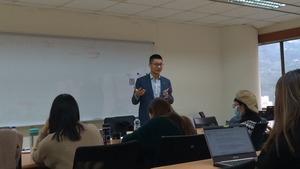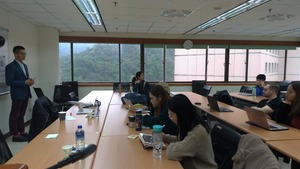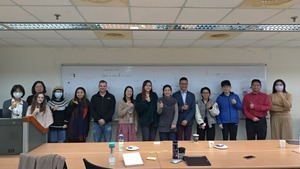Date :
2020-12-28
Department :
International Master's Program in International Studies
【Article by IMPIS】
The International Mater's Program in International Studies (IMPIS) on December 25th invited Dr. George Yin, assistant professor of political science from Swarthmore College, and also an associate in research at Fairbank Center for Chinese Studies, Harvard University, to provide an insightful analysis on the topic “Great Power Politics and Climate Change” to the students in the course Seminar on Energy and Environment Issues.
Dr. Yin started by introducing the concept and evolution of politics of climate change. The 1992 United Nations Framework Convention on Climate Change (UNFCCC) was the first ever global convention related to climate change and was a significant milestone for climate politics. Started from the 1997 Kyoto Protocol, the signatory states started to designate more concrete regulations and planned to reduce carbon emission year after year. However, although developed countries were the one who the world believed should take the lead, the United States at the time withdrew its signature and Canada pulled itself out from the Protocol in 2011 as well. These incidents cast doubt on the credibility of the Protocol and has brought difficulties in pursuing the goals set by the states. The 2016 Paris Agreement was a great breakthrough for climate change. Yet, Paris Agreement could be only interpreted as a gentlemen’s agreement, since it is not legally-binding comparing to the previous documents and does not provide a strict agenda for the goals.
Dr. Yin continued by explaining the relationship between great power politics and climate change. One can not ignore Realism when talking about the definition of great power politics. Realist scholars, such as the famous Hans Morgenthau and Kenneth Waltz, argued that the international system is anarchic. As states are the main actors in the international system, they put emphasis on the balance of power between each other and list security as their top interest. States with relatively strong comprehensive national power, such as the United States, China, India, and etc, would be viewed as Great Powers which do not only have a loader voice in the international arena, but also play an important role in numerous global initiatives. And climate change is the kind of initiative that needs the cooperation and collaboration between states and will be significantly affected by great power politics.
As for the characteristic of politics of climate change, Dr. Yin believed that climate change is a kind of public good which free-riding is inevitable when states are trying to deal with the problem. The two main criteria that distinguish a public good are that it must be non-rivalrous and non-excludable. This somehow echoes the Common But Differentiated Responsibilities that climate change brought to states. When devoted states are working hard trying to deal with climate change, states that are unwilling to cooperate or list the problem low on their political agenda will choose to free-ride but enjoy the fruit of others’ effort as well.
Dr. Yin also pointed out that developed and developing states usually do not possess identical ability to mitigate and adapt to climate change. Since mitigation and adaptation might cost a fortune or seriously impact the form and development of a state’s industry chain, most scholars believed that comparing to developing states, developed states will be more capable to mitigate and adapt to climate change economically.
Today, climate change has become an urgent global issue that needs everyone’s attention. As for the effort that states put into dealing the problem, Dr. Yin was not pessimistic about it, but he pointed out that commitment problem might be a challenge for states. To be more specific, although currently the US president-elect Joe Biden promised that the United States will be re-joining the Paris Agreement, it is still possible for the United States to have another president that possesses an opposing idea. How the world should deal with climate change without the US support is something that Dr. Yin left for the students to think of.




